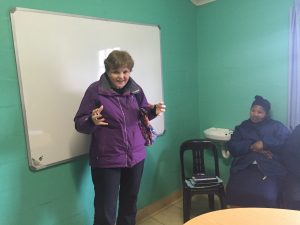
There are four intersecting epidemics among pregnant women in South Africa: hazardous alcohol use (30%), HIV (27%), TB (60% of HIV+),  and malnutrition (24% of infants). Unless the prevention programs for these epidemics are horizontally integrated, there will never be adequate resources to address these challenges and stigma will dramatically reduce program utilization. Furthermore, while clinics are the typical sites for treating each of these health problems, the NIAAA-funded Philani study is examining a home-visiting prevention program delivered by neighborhood Mentor Mothers (MM) as an alternative to clinic-based interventions to reduce the consequences of hazardous alcohol use, HIV, TB, and poor nutrition. The intervention encourages mothers to care for their own health, parent well, maintain their mental health, and, if the mother is living with HIV (HIV+ MAR), reduce HIV transmission and/or reduce alcohol use and abuse. The results begin to inform the optimal delivery strategy for the next generation of preventive interventions in order to be feasible and sustainable for broad dissemination immediately following an efficacy trial.
and malnutrition (24% of infants). Unless the prevention programs for these epidemics are horizontally integrated, there will never be adequate resources to address these challenges and stigma will dramatically reduce program utilization. Furthermore, while clinics are the typical sites for treating each of these health problems, the NIAAA-funded Philani study is examining a home-visiting prevention program delivered by neighborhood Mentor Mothers (MM) as an alternative to clinic-based interventions to reduce the consequences of hazardous alcohol use, HIV, TB, and poor nutrition. The intervention encourages mothers to care for their own health, parent well, maintain their mental health, and, if the mother is living with HIV (HIV+ MAR), reduce HIV transmission and/or reduce alcohol use and abuse. The results begin to inform the optimal delivery strategy for the next generation of preventive interventions in order to be feasible and sustainable for broad dissemination immediately following an efficacy trial.
Targeted Risk Group:
Mothers at risk for hazardous alcohol use, HIV, TB, and malnutrition, as well as their infants
Published Journal Articles:
- [Download not found]
- [Download not found]
- [Download not found]
- [Download not found]
- [Download not found]
- [Download not found]
- [Download not found]
- [Download not found]
- [Download not found]
- [Download not found]
- [Download not found]
- [Download not found]
- [Download not found]
- [Download not found]
- [Download not found]
- [Download not found]
- [Download not found]
- [Download not found]
- [Download not found]
- [Download not found]
- [Download not found]
- [Download not found]
- [Download not found]
- [Download not found]
- [Download not found]
- [Download not found]
- [Download not found]
Interventions, Training Manuals, etc:
- [Download not found]
- [Download not found]
- [Download not found]
- [Download not found]
- [Download not found]
- Tolerance, Worried, Eye-Opener, Amnesia, Cut Down (TWEAK) - Survey
- Social Support - Survey
- Romantic Relationships - Survey
- Reproductive Health - Survey
- [Download not found]
- Routines
- Relationships and Violence - Survey
- Household Characteristics and Composition - Survey
- AIDS Knowledge and Attitude for Pregnant Women - Survey
- Edinburgh Postnatal Depression Score (EPDS)
- Alcohol Use Disorders Identification Test (Audit C) - Scale
- Feeding Strategies to Prevent Transmission - Survey
- Medication Adherence - Survey
- Employment and Labor Experience Assessment - Survey
- CDC Sexual Behavior Questions (CSBQ)
- [Download not found]
- Alcohol and Other Drug Abuse (AOD) - Scale
- [Download not found]
- HIV Testing Assessment - Survey
- General Medical History Assessment
- General Health Questionnaire
Intervention model:
Mothers who are thriving in the community are chosen to act as role models, i.e. mentor mothers, for mothers at risk in the same community. This is based on the positive peer deviant model. Mentor mothers conduct home visits during the course of the study.
Research Methods:
Twenty four neighborhoods were randomly assigned to the intervention (12 neighborhoods), i.e. a mentor mother home visiting program, or control condition (12 neighborhoods). There are two levels of nesting in the study. Mothers and their infants are nested within neighborhoods, and repeated observations over time are nested within individuals. Longitudinal random effect regression models will be used to account for the nesting and examine the efficacy of the intervention at improving the health of infants and their mothers over time.
Local Significance:
The study is ongoing so it is too early to draw conclusions on the effectiveness of the intervention. Preliminary results are promising and suggest the mentor mother program may be an efficient mechanism to conduct healthcare-related home visits.
International Significance:
If found to be efficacious, the home-visiting model that relies on paraprofessionals, i.e. trained mentor mothers, offers a viable alternative to clinic-based healthcare and or care that requires professional healthcare providers that may not be practical in poorer countries outside the U.S.
